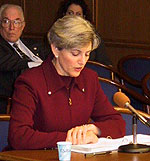House and Senate at odds over funding unemployment benefits
By Tom Scheck
Minnesota Public Radio
January 30, 2002
|
| RealAudio |
State officials told House and Senate committees that Minnesota's two funds for the unemployed are running out of money. Thousands of layoffs have drained cash from both the Unemployment Insurance Trust Fund and the Dislocated Worker Program. House DFLers reacted by criticizing the Ventura administration and House Republicans for not providing any solutions to the problem. Others warned against treating the budget problems a partisan political issue.
| |
|
|
|
||
Job placement coordinators and local government officials told lawmakers workers would be devastated if the Dislocated Worker Fund dries up.
Stearns County Commissioner Larry Haws says he's worried about the loss of 2,700 Fingerhut jobs in St.Cloud if its parent company, Federated Department stores, closes it.
"I talked to a lady who started there when she was 16 years old at Fingerhut. She's 40 years old now. She said 'What do I know? All I know is how to work for Fingerhut.' Given the chance to retrain, we can make that transition, but not without retraining," he said.
Meanwhile, Gov. Jesse Ventura met with officials from Fingerhut and its parent company Federated Department Stores. Afterwards, Commissioner of Trade and Economic Development Rebecca Yanisch said she perceived a shift in Federated's stance. She says the comments from Federated officials indicate that they now believe there's the potential for "a good purchaser to step forward."
Initially the company said it was unlikely a buyer could be found.
Yanisch says training for Fingerhut and other workers will be threatened if cash isn't put into the Dislocated Worker Program. She says the program only has a balance of $3.4 million remaining.
Yanisch says a record number of workers at companies from LTV Steel, Northwest Airlines and ADC Telecommunications, are all being retrained through the program. She says it would cost the department about $7 million to retrain just half of Fingerhut's employees.
"We've got the capacity to serve 1,250 employees in the mass lay-off whether from from Fingerhut or from other employers that we're aware of that are still considering adjustments to their workforce. We'll be working with the finance department to try to lay-out strategies based on this projection of need," Yanisch said.
This week, the legislative auditor reported the state's unemployment insurance trust fund could dry up by next year. Workers would continue to receive benefits. But the state would be forced to borrow money from the federal government at a 6-percent interest rate.
House and Senate DFLers used the committee discussions to criticize the Ventura administration and Republicans for lowering the funding formula for the Dislocated Worker Program in 1999 and for failing to propose long term solutions now the program is running out of money.
Rep. Tim Mahoney, DFL-St. Paul, says he'd would like to increase the employer tax and use $95 million from the state's Worker's Comp funds to revitalize both programs.
"We have two funds that are almost depleted. We're in a vehicle heading for a crash and we're running out of gas. These are insurance for the people that make this state great. And the governor can't give us an answer and apparently the Republicans don't have an answer. It's time that they come forward and either act on our proposals or give us what they want to do," Mahoney said.
Both House Republicans and Gov. Ventura are planning to use a large portion of the state's worker's comp fund to help balance the state budget.
Rep. Jim Knoblach, R-St.Cloud, says DFLers are trying to politicize the issue. He says the DFLers are off the mark with their spending plans.
"They have a bill that says they need $95 million. One of the people who spoke today said it really needed $30 million and we've heard other people say they need $15 to $20 million. In this time of the budget deficits, we want to fund it but we want to fund it with the right amount. And we're looking forward to working with the DFL to figure out what that right amount is," he said.
Knoblach says House Republicans could have a plan to remedy the workforce development fund by next week.
Commissioner Yanisch says the Ventura administration could have proposals ready in two weeks.
More from MPR
